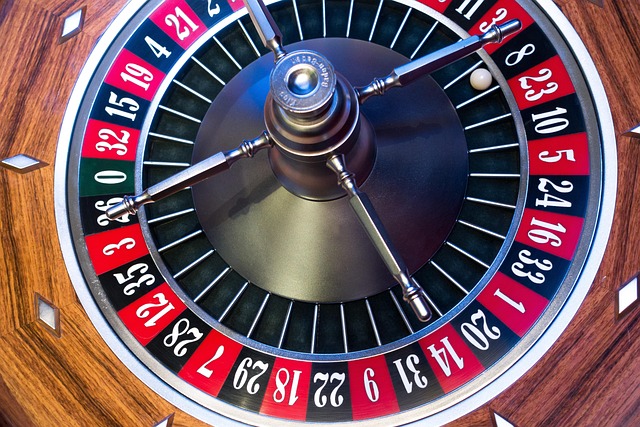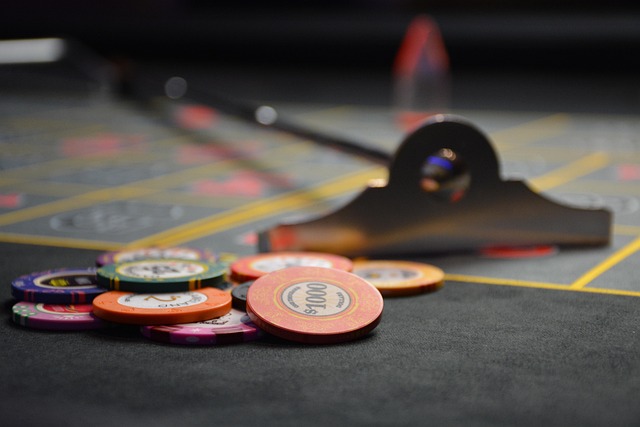Roulette combines chance and skill, demanding an understanding of odds and probabilities for effective strategy. Key aspects include recognizing 1 in 37 chances for single number bets and 50-50 red/black probability, managing bankrolls based on these insights, and adapting to the game's independence. Roulette offers various bet types with differing risks and rewards, from simple 1:1 bets to complex 35:1 options. Crafting a successful Roulette Strategy involves understanding these, balancing bankroll allocation, assessing risk tolerance, and aligning bet size with table limits and personal preference for an exciting yet profitable gaming experience.
Roulette is a captivating game of chance, but understanding its odds can empower players. This article delves into the heart of roulette strategy by demystifying probabilities and popular techniques. We explore the fine art of calculating chances, analyzing renowned strategies like Martingale, Paroli, and Fibonacci, and provide practical tips for implementing a sustainable approach. Discover how to balance risk and reward, set boundaries, and adapt your strategy within the dynamic landscape of roulette.
- Understanding Roulette Odds and Probabilities
- – Definition of roulette odds
- – Breakdowns of bet types and payoffs
Understanding Roulette Odds and Probabilities

Roulette is a game that combines chance and skill, making it both thrilling and challenging for players. Understanding the odds and probabilities is a crucial aspect of any roulette strategy. Each bet in roulette has its own set of chances; for instance, betting on a single number has a 1-in-37 chance of success (assuming a European wheel), while betting on red or black has a 50-50 probability.
Knowing these odds is essential when formulating a winning roulette strategy. Players can use this knowledge to place more informed bets, managing their bankroll effectively and maximising potential wins. A good understanding of probabilities allows for strategic decision-making, enabling players to adapt their approach based on the game’s dynamic nature.
– Definition of roulette odds

Roulette odds refer to the mathematical probabilities associated with each bet on a roulette table. These odds play a crucial role in shaping an effective Roulette strategy. Understanding the potential payout for each bet type is essential for players looking to make informed decisions and maximize their chances of winning. By knowing the roulette odds, players can assess the risk-reward ratio of different betting options, allowing them to create a strategic approach tailored to their preferences and bankroll management goals within this popular casino game.
In the context of a Roulette Strategy, players often seek patterns and trends in past spins to guide their bets, but it’s important to remember that each spin is an independent event. The house edge, which represents the average advantage held by the casino over the player, varies between different roulette types, influencing the overall odds. Knowing these dynamics empowers players to make more calculated moves, considering both short-term gains and long-term sustainability in their chosen Roulette Strategy.
– Breakdowns of bet types and payoffs

Roulette is a captivating game with numerous bet types, each offering distinct advantages and risks. Understanding these bets and their payoffs is key to crafting an effective roulette strategy. Common bet categories include straight-up bets (betting on a single number), split bets (covering two adjacent numbers), street bets (three numbers in a row), and corner bets (four numbers that form a square). Each has its own payoff structure, with higher payouts often associated with more complex bets but also carrying greater risks. For instance, a straight-up bet pays 35:1, while a simple red/black or even/odd bet offers odds of 1:1.
Mastering the art of allocating your bankroll and deciding when to take calculated risks is vital. Some players prefer a more conservative approach, focusing on even money bets for sustained play, while others embrace the thrill of higher-risk, higher-reward strategies. A well-thought-out roulette strategy should consider factors like bet size, table limits, and personal risk tolerance to ensure an enjoyable and potentially lucrative gaming experience.
While there’s no guaranteed roulette strategy for winning every time, understanding the odds and probabilities can empower players to make informed decisions. By familiarizing yourself with different bet types and their respective payoffs, you can develop a strategic approach that aligns with your risk tolerance and goals. Remember, responsible gambling involves knowing your limits and enjoying the thrill of the spin.






